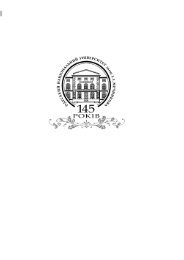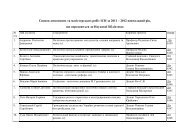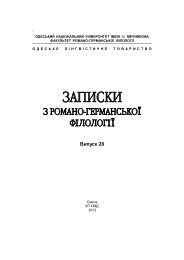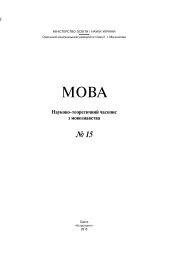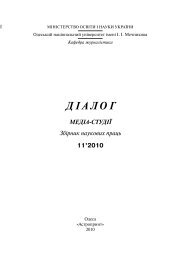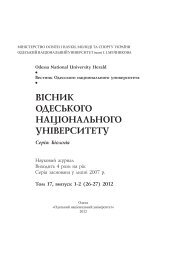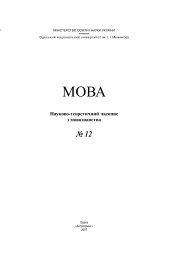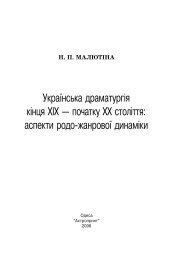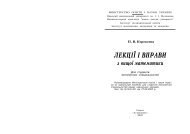Ðип. 26 (2011)
Ðип. 26 (2011)
Ðип. 26 (2011)
Create successful ePaper yourself
Turn your PDF publications into a flip-book with our unique Google optimized e-Paper software.
Pasternak T. A.COMMUNICATIVE STRATEGIES OF ENGLISH «JOB INTERVIEW» ...<br />
Ernest: Does the job carry a pension, sir? – Ernest asked anxiously.<br />
In the given example Director violates the Maxim of Relevance having<br />
changed the topic of the interview about the causes of candidate’s changing the<br />
job for the irrelevant one about the attitude of modern youth to the pension, which<br />
doesn’t refer to the issue:<br />
Most young men these days seem to want dull jobs. The first question young<br />
men ask me is whether the job I’m offering carries a pension. They want to<br />
retire before they start!<br />
The implicature, generated by Director, says that the vacancy doesn’t include<br />
pension benefit.<br />
According to Deirdre Wilson and Dan Sperber Maxim of Relevance is realized<br />
in any phrase without exception as every expression and their succession in<br />
discourse have certain function and meet certain aims. Thus, communicant chooses<br />
corresponding language means that meet these aims. This principle is known as<br />
“communicative principle of relevance” and states that every act of overt communication<br />
conveys a presumption of its own optimal relevance. According to<br />
relevance theory, the presumption of optimal relevance conveyed by every utterance<br />
is precise enough to ground a specific comprehension heuristic that hearers<br />
may use in interpreting the speaker’s meaning. Presumption of optimal relevance<br />
means: a) the utterance is relevant enough to be worth processing; b) it is the most<br />
relevant one compatible with the communicator’s abilities and preferences. So,<br />
the principle of relevance is used in communication irrespective of observance,<br />
violation or flouting the cooperative principle by communicants [11].<br />
The Maxim of Manner doesn’t concern the contents of the utterance but the<br />
manner of delivering it by the speaker and is formulated as follows: “Be clear”. It<br />
means to avoid obscurity of expression, and ambiguity and to be brief and orderly.<br />
If the speaker wants to show that he observes this Maxim, he uses the utterances<br />
of clarification: „I mean, Concerning …, As for …, Know what I mean? Do you<br />
understand?” Violation of the Maxim of Manner can be seen in the incoherence<br />
of the utterances, use of junk words, such as I’d say, just, something like that, or<br />
so; and inappropriate use of other genres. Let’s consider the example:<br />
Michael: ... What can we do to increase sales of the second brand?<br />
Alexander: So, in life, there are trustworthy things and untrustworthy things.<br />
And everything is so because we will it to be so. I’d say, just put them in the<br />
front of the shop, right in the window, or, just cut the price or something. In<br />
this case what is required is taking practical action, instead of speculation.<br />
The given extract illustrates the violation of the Maxim of Manner by the candidate<br />
(Alexander). The answer lacks the logical coherence, as the philosophical<br />
reasoning is mixed with concrete steps/actions (everything is so because we will<br />
it to be so - just put them in the front of the shop; cut the price or something). The<br />
candidate replaces terms from professional language with ones from colloquial<br />
genre (front of the shop, right in the window in spite of show-window); uses contex-<br />
303



